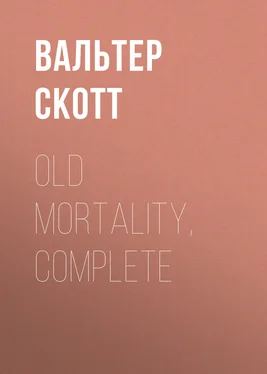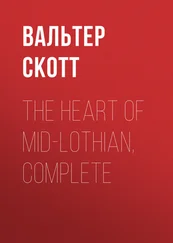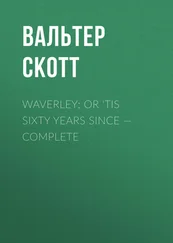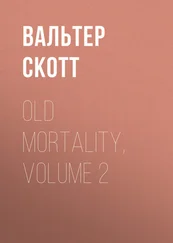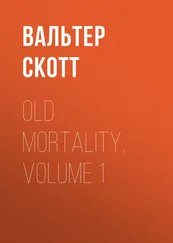Вальтер Скотт - Old Mortality, Complete
Здесь есть возможность читать онлайн «Вальтер Скотт - Old Mortality, Complete» — ознакомительный отрывок электронной книги совершенно бесплатно, а после прочтения отрывка купить полную версию. В некоторых случаях можно слушать аудио, скачать через торрент в формате fb2 и присутствует краткое содержание. Жанр: foreign_prose, foreign_antique, на английском языке. Описание произведения, (предисловие) а так же отзывы посетителей доступны на портале библиотеки ЛибКат.
- Название:Old Mortality, Complete
- Автор:
- Жанр:
- Год:неизвестен
- ISBN:нет данных
- Рейтинг книги:4 / 5. Голосов: 1
-
Избранное:Добавить в избранное
- Отзывы:
-
Ваша оценка:
- 80
- 1
- 2
- 3
- 4
- 5
Old Mortality, Complete: краткое содержание, описание и аннотация
Предлагаем к чтению аннотацию, описание, краткое содержание или предисловие (зависит от того, что написал сам автор книги «Old Mortality, Complete»). Если вы не нашли необходимую информацию о книге — напишите в комментариях, мы постараемся отыскать её.
Old Mortality, Complete — читать онлайн ознакомительный отрывок
Ниже представлен текст книги, разбитый по страницам. Система сохранения места последней прочитанной страницы, позволяет с удобством читать онлайн бесплатно книгу «Old Mortality, Complete», без необходимости каждый раз заново искать на чём Вы остановились. Поставьте закладку, и сможете в любой момент перейти на страницу, на которой закончили чтение.
Интервал:
Закладка:
Walter Scott
Old Mortality, Complete
EDITOR’S INTRODUCTION TO OLD MORTALITY
The origin of “Old Mortality,” perhaps the best of Scott’s historical romances, is well known. In May, 1816, Mr. Joseph Train, the gauger from Galloway, breakfasted with Scott in Castle Street. He brought gifts in his hand,—a relic of Rob Roy, and a parcel of traditions. Among these was a letter from Mr. Broadfoot, schoolmaster in Pennington, who facetiously signed himself “Clashbottom.” To cleish, or clash, is to “flog,” in Scots. From Mr. Broadfoot’s joke arose Jedediah Cleishbotham, the dominie of Gandercleugh; the real place of Broadfoot’s revels was the Shoulder of Mutton Inn, at Newton Stewart. Mr. Train, much pleased with the antiques in “the den” of Castle Street, was particularly charmed by that portrait of Claverhouse which now hangs on the staircase of the study at Abbotsford. Scott expressed the Cavalier opinions about Dundee, which were new to Mr. Train, who had been bred in the rural tradition of “Bloody Claver’se.”
[The Editor’s first acquaintance with Claverhouse was obtained through an old nurse, who had lived on a farm beside a burn where, she said, the skulls of Covenanters shot by Bloody Claver’se were still occasionally found. The stream was a tributary of the Ettrick.]
“Might he not,” asked Mr. Train, “be made, in good hands, the hero of a national romance as interesting as any about either Wallace or Prince Charlie?” He suggested that the story should be delivered “as if from the mouth of Old Mortality.” This probably recalled to Scott his own meeting with Old Mortality in Dunnottar Churchyard, as described in the Introduction to the novel.
The account of the pilgrim, as given by Sir Walter from Mr. Train’s memoranda, needs no addition. About Old Mortality’s son, John, who went to America in 1776 (? 1774), and settled in Baltimore, a curious romantic myth has gathered. Mr. Train told Scott more, as his manuscript at Abbotsford shows, than Scott printed. According to Mr. Train, John Paterson, of Baltimore, had a son Robert and a daughter Elizabeth. Robert married an American lady, who, after his decease, was married to the Marquis of Wellesley. Elizabeth married Jerome Bonaparte! Sir Walter distrusted these legends, though derived from a Scotch descendant of Old Mortality. Mr. Ramage, in March, 1871, wrote to “Notes and Queries” dispelling the myth.
According to Jerome Bonaparte’s descendant, Madame Bonaparte, her family were Pattersons, not Patersons. Her Baltimore ancestor’s will is extant, has been examined by Old Mortality’s great-grandson, and announces in a kind of preamble that the testator was a native of Donegal; his Christian name was William (“Notes and Queries,” Fourth Series, vol. vii. p. 219, and Fifth Series, August, 1874). This, of course, quite settles the question; but the legend is still current among American descendants of the old Roxburghshire wanderer.
“Old Mortality,” with its companion, “The Black Dwarf,” was published on December 1, 1816, by Mr. Murray in London, and Mr. Blackwood in Edinburgh.
The name of “The Author of ‘Waverley’” was omitted on the title-page. The reason for a change of publisher may have been chiefly financial (Lockhart, v. 152). Scott may have also thought it amusing to appear as his own rival in a new field. He had not yet told his secret to Lady Abercorn, but he seems to reveal it (for who but he could have known so much about the subject?) in a letter to her, of November 29, 1816. “You must know the Marquis well,—or rather you must be the Marquis himself!” quoth Dalgetty. Here follow portions of the letter:
I do not like the first story, “The Black Dwarf,” at all; but the long one which occupies three volumes is a most remarkable production. . . . I should like to know if you are of my opinion as to these new volumes coming from the same hand. . . . I wander about from nine in the morning till five at night with a plaid about my shoulders and an immensely large bloodhound at my heels, and stick in sprigs which are to become trees when I shall have no eyes to look at them. . . .
I am truly glad that the Tales have amused you. In my poor opinion they are the best of the four sets, though perhaps I only think so on account of their opening ground less familiar to me than the manners of the Highlanders. . . . If Tom—[His brother, Mr. Thomas Scott.]—wrote those volumes, he has not put me in his secret. . . . General rumour here attributes them to a very ingenious but most unhappy man, a clergyman of the Church of Scotland, who, many years since, was obliged to retire from his profession, and from society, who hides himself under a borrowed name. This hypothesis seems to account satisfactorily for the rigid secrecy observed; but from what I can recollect of the unfortunate individual, these are not the kind of productions I should expect from him. Burley, if I mistake not, was on board the Prince of Orange’s own vessel at the time of his death. There was also in the Life Guards such a person as Francis Stewart, grandson of the last Earl of Bothwell. I have in my possession various proceedings at his father’s instance for recovering some part of the Earl’s large estates which had been granted to the Earls of Buccleugh and Roxburgh. It would appear that Charles I. made some attempts to reinstate him in those lands, but, like most of that poor monarch’s measures, the attempt only served to augment his own enemies, for Buccleugh was one of the first who declared against him in Scotland, and raised a regiment of twelve hundred men, of whom my grandfather’s grandfather (Sir William Scott of Harden) was lieutenant-colonel. This regiment was very active at the destruction of Montrose’s Highland army at Philiphaugh. In Charles the Second’s time the old knight suffered as much through the nonconformity of his wife as Cuddie through that of his mother. My father’s grandmother, who lived to the uncommon age of ninety-eight years, perfectly remembered being carried, when a child, to the field-preachings, where the clergyman thundered from the top of a rock, and the ladies sat upon their side-saddles, which were placed upon the turf for their accommodation, while the men stood round, all armed with swords and pistols. . . . Old Mortality was a living person; I have myself seen him about twenty years ago repairing the Covenanters’ tombs as far north as Dunnottar.
If Lady Abercorn was in any doubt after this ingenuous communication, Mr. Murray, the publisher, was in none. (Lockhart, v. 169.) He wrote to Scott on December 14, 1816, rejoicing in the success of the Tales, “which must be written either by Walter Scott or the Devil. . . . I never experienced such unmixed pleasure as the reading of this exquisite work has afforded me; and if you could see me, as the author’s literary chamberlain, receiving the unanimous and vehement praises of those who have read it, and the curses of those whose needs my scanty supply could not satisfy, you might judge of the sincerity with which I now entreat you to assure the Author of the most complete success.” Lord Holland had said, when Mr. Murray asked his opinion, “Opinion! We did not one of us go to bed last night,—nothing slept but my gout.”
The very Whigs were conquered. But not the Scottish Whigs, the Auld Leaven of the Covenant,—they were still dour, and offered many criticisms. Thereon Scott, by way of disproving his authorship, offered to review the Tales in the “Quarterly.” His true reason for this step was the wish to reply to Dr. Thomas McCrie, author of the “Life of John Knox,” who had been criticising Scott’s historical view of the Covenant, in the “Edinburgh Christian Instructor.” Scott had, perhaps, no better mode of answering his censor. He was indifferent to reviews, but here his historical knowledge and his candour had been challenged. Scott always recognised the national spirit of the Covenanters, which he remarks on in “The Heart of Mid-Lothian,” and now he was treated as a faithless Scotsman. For these reasons he reviewed himself; but it is probable, as Lockhart says, that William Erskine wrote the literary or aesthetic part of the criticism (Lockhart, v.174, note).
Читать дальшеИнтервал:
Закладка:
Похожие книги на «Old Mortality, Complete»
Представляем Вашему вниманию похожие книги на «Old Mortality, Complete» списком для выбора. Мы отобрали схожую по названию и смыслу литературу в надежде предоставить читателям больше вариантов отыскать новые, интересные, ещё непрочитанные произведения.
Обсуждение, отзывы о книге «Old Mortality, Complete» и просто собственные мнения читателей. Оставьте ваши комментарии, напишите, что Вы думаете о произведении, его смысле или главных героях. Укажите что конкретно понравилось, а что нет, и почему Вы так считаете.
